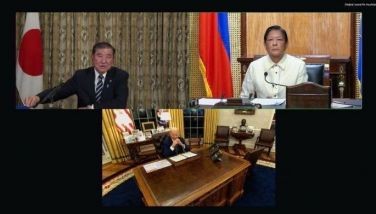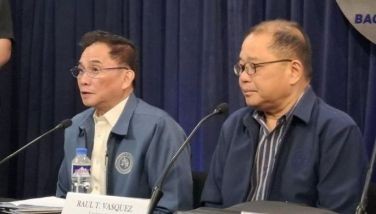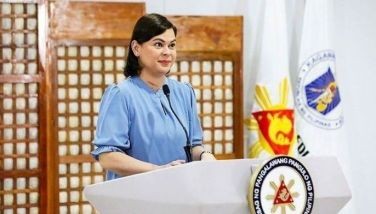Palace denies whitewash in IPP review
July 9, 2002 | 12:00am
What whitewash?
Malacañang vehemently denied yesterday the accusation by the opposition that the Cabinet Review Committee investigating former President Fidel Ramos on the controversial contracts he entered with independent power producers (IPPs) is trying to whitewash the case.
Acting Press Secretary Silvestre Afable said the accusation was "very absurd."
"That’s really very absurd because the inquiry was done in a very transparent way," he said.
Opposition Sen. Tessie Aquino-Oreta earlier accused the Palace of whitewashing its probe of Ramos. She said the review committee was trying to exempt Ramos from any blame on the allegedly onerous IPP contracts which resulted in the people paying for electricity which they never used.
Afable said the President herself released last week the committee’s findings and recommendations from its preliminary probe on the IPP deals with the state-owned National Power Corp. (Napocor).
According to Afable, the committee, headed by Finance Secretary Jose Isidro Camacho, still has three months to finish its investigation.
"The situation now is that the committee has had some findings and in the next three months, it will submit a report or a proposal on how its findings will be implemented, arbitrated, renegotiated and resolved," he said.
Afable also clarified that the committee has not reached yet the point where it can already recommend the filing of charges against any government official.
"The issue about filing cases in court is not relevant at this time. The committee is still at the stage of formulating detailed options to take," he said, adding that Oreta’s allegation was unfair for Ramos since it does not reflect the committee’s real situation.
Afable assured that when the investigation is completed, those found to have done something amiss will definitely be charged.
"The opposition should actually welcome this and participate in a constructive way," he stressed.
For his part, Ramos told reporters yesterday that he was not the one who approved all the IPP contracts during his term.
At a press conference in Makati, the former president said it was the Energy Regulatory Board (ERB) which had the hand in the government’s contracts with IPPs.
He pointed out that even he as president could not influence the ERB in any way, the agency being autonomous and independent.
"The ERB is an autonomous and independent body that can overrule anything that the chief executive and the National Economic Development Authority propose because that is their mandate under the law," he explained.
Ramos said, however, that as far as he knows, the IPP contracts were all subjected to due diligence as prescribed by the Electricity Power Crisis Act of 1993 and the Expanded Build, Operate and Transfer Law of 1994.
"The due diligence process was followed very strictly," he said.
Ramos pointed out that the findings of the committee created by President Arroyo to review the IPP contracts may have failed to take a "holistic approach" in the evaluation of the situation.
He explained that the IPPs were not mere power producers but also a contributor to the economy and the environment.
"The country reduced its dependence on foreign sources for energy requirements because of these IPPs," he said.
According to Ramos, in 1992, the energy produced from indigenous sources was pegged at 32 percent. During the end of his term in 1998, the figure went up to 42 percent, with the rest still coming from foreign sources.
Ramos added that his government connected areas that have huge requirement for electricity to the IPPs, hence the oversupply of power were clearly put into good use.
On the issue of environment, Ramos said part of the functions of IPPs is the conservation and right use of water. He said two of the five projects cited by the committee investigating the IPPs as problematic were in fact helping irrigate farms and were supplying potable water to its service areas.
"I think some of these aspects were forgotten or plainly ignored in the review," he said.
Ramos stressed that he made "hard decisions" during his term to resolve the power crisis and restore investor confidence in the country.
"I stand by those decisions. If they want to investigate me, fine. Let them," he said.
Malacañang vehemently denied yesterday the accusation by the opposition that the Cabinet Review Committee investigating former President Fidel Ramos on the controversial contracts he entered with independent power producers (IPPs) is trying to whitewash the case.
Acting Press Secretary Silvestre Afable said the accusation was "very absurd."
"That’s really very absurd because the inquiry was done in a very transparent way," he said.
Opposition Sen. Tessie Aquino-Oreta earlier accused the Palace of whitewashing its probe of Ramos. She said the review committee was trying to exempt Ramos from any blame on the allegedly onerous IPP contracts which resulted in the people paying for electricity which they never used.
Afable said the President herself released last week the committee’s findings and recommendations from its preliminary probe on the IPP deals with the state-owned National Power Corp. (Napocor).
According to Afable, the committee, headed by Finance Secretary Jose Isidro Camacho, still has three months to finish its investigation.
"The situation now is that the committee has had some findings and in the next three months, it will submit a report or a proposal on how its findings will be implemented, arbitrated, renegotiated and resolved," he said.
Afable also clarified that the committee has not reached yet the point where it can already recommend the filing of charges against any government official.
"The issue about filing cases in court is not relevant at this time. The committee is still at the stage of formulating detailed options to take," he said, adding that Oreta’s allegation was unfair for Ramos since it does not reflect the committee’s real situation.
Afable assured that when the investigation is completed, those found to have done something amiss will definitely be charged.
"The opposition should actually welcome this and participate in a constructive way," he stressed.
For his part, Ramos told reporters yesterday that he was not the one who approved all the IPP contracts during his term.
At a press conference in Makati, the former president said it was the Energy Regulatory Board (ERB) which had the hand in the government’s contracts with IPPs.
He pointed out that even he as president could not influence the ERB in any way, the agency being autonomous and independent.
"The ERB is an autonomous and independent body that can overrule anything that the chief executive and the National Economic Development Authority propose because that is their mandate under the law," he explained.
Ramos said, however, that as far as he knows, the IPP contracts were all subjected to due diligence as prescribed by the Electricity Power Crisis Act of 1993 and the Expanded Build, Operate and Transfer Law of 1994.
"The due diligence process was followed very strictly," he said.
Ramos pointed out that the findings of the committee created by President Arroyo to review the IPP contracts may have failed to take a "holistic approach" in the evaluation of the situation.
He explained that the IPPs were not mere power producers but also a contributor to the economy and the environment.
"The country reduced its dependence on foreign sources for energy requirements because of these IPPs," he said.
According to Ramos, in 1992, the energy produced from indigenous sources was pegged at 32 percent. During the end of his term in 1998, the figure went up to 42 percent, with the rest still coming from foreign sources.
Ramos added that his government connected areas that have huge requirement for electricity to the IPPs, hence the oversupply of power were clearly put into good use.
On the issue of environment, Ramos said part of the functions of IPPs is the conservation and right use of water. He said two of the five projects cited by the committee investigating the IPPs as problematic were in fact helping irrigate farms and were supplying potable water to its service areas.
"I think some of these aspects were forgotten or plainly ignored in the review," he said.
Ramos stressed that he made "hard decisions" during his term to resolve the power crisis and restore investor confidence in the country.
"I stand by those decisions. If they want to investigate me, fine. Let them," he said.
BrandSpace Articles
<
>
- Latest
- Trending
Trending
Latest
Trending
Latest
Recommended


































